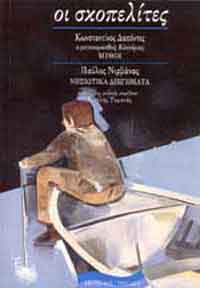 Caesar Dapontes
Caesar Dapontes
His life
Born on Skopelos where he also had his basic education. In 1831, he travelled to Constantinople where he remained for a few months and later travelled to Bucharest, where he studied and then later to Iasou, where he resided for the next 4 years and worked as secretary of the sovereign Konstantinos Mavrokordatou.
Up to 1843, he served as 2nd secretary of the sovereign. In the same year he resigned as the sovereign refused to promote him to the 1st secretary. He was then made 1st secretary in the service of the new sovereign of Moldavia, Ioannis Mavrokordatou and installed in Iasou. He acquired wealth and was promoted again, but in 1747 he was jailed for about 20 months for his own irregularities and intrigues in the royal court. After his release he remained in Constantinople and married for the second time, his first wife had died. He lost his second wife and their daughter two years later. In 1753, disappointed by the unpleasant course of his life, he decided to become a monk. He took the name Kaisarios and lived on the islet of Piperi (Pepper) close to Skopelos and Evanelistrias Abbey on Skopelos, for three years. In 1757, he travelled to the Agios Oros (Holy Mount) and was installed in the Xiropotamou Abbey.
During the following years he toured Greece and the areas close to the Danube to collect donations for the abbey. Returning to Agios Oros in 1765 and staying in the Xiropotamou and Koutloumousiou Abbeys up to 1778. He then returned to the Evanelistrias Abbey on Skopelos where he stayed until 1784, then returned to the Xiropotamou Abbey and died a few months later.
His life was recounted in the narrative verse of the Garden of Graces that was written in 1768 and is addressed to Alexandros Mavrokordato of Firari.
His Works
Dapontes was a copious writer. His work numbers many thousands of fifteen syllable verses, with religious content, chronographic, or autobiographic and generally with moral intentions. Critics of his work state, beyond the technical deficit as chatter and improvisation, with the positive elements of humour, wisdom, observation and certain insights. He published many books himself, but others remained as anecdotes on manuscripts.
Many of these anecdotes were published for the first time by Konstantinos Satha in the Medieval Library and by Emile Legrand in the Bibliothcque Grecque vulgaire. An important note regarding the publishing of Dapontes articles and manuscripts was placed at the end, a warning (penance) to future editors to ensure that they do not omit verses, do not make errors and do not appropriate or degrade his texts, because in this case they will have opposed God.
Some of his more important works are:
- Women’s Mirror
- Morality
- The Skopelites
- Spiritual Bank
- Reasons to Celebrate
- Making Schemes of Many Exceptional Things
- Garden of Graces
- The Chronographer
- Geographical History
- Dakike Newspapers
|


